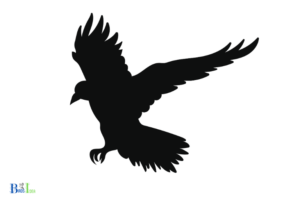What Happens If You Kill a Crow? Find Out!!
Killing a crow can result in various consequences, including legal ramifications under the Migratory Bird Treaty Act, ecological disturbances such as disruption to the food web, cultural impacts considering crows’ significance in many traditions, and scientific interest due to their intelligence and social behavior.
Ecologically, crows play a role in controlling pest populations and cleaning up carrion, so their removal could unbalance the local ecosystem.
Culturally, crows hold importance in many mythologies and are often seen as omens or messengers.
Scientifically, crows are of interest due to their advanced cognitive abilities and complex social structures. The elimination of a crow can affect research in these areas.
The demise of a crow can resonate beyond its immediate environment, potentially altering the delicate balance of nature and affecting human perceptions rooted in age-old traditions.

Key Takeaway
Legal Consequences of Killing a Crow
The killing of a crow is subject to legal consequences under various wildlife protection and animal cruelty laws.
Crows are protected under the Migratory Bird Treaty Act in the United States, making it illegal to kill them without a permit.
Additionally, crows are often considered to be an essential part of the ecosystem, and their protection is vital for maintaining ecological balance.
Those found guilty of killing a crow may face significant fines, imprisonment, or both, depending on the circumstances and the specific laws of the jurisdiction.
Furthermore, animal cruelty laws in many places also prohibit the unnecessary killing of crows or any other animals.
These laws aim to ensure the ethical and humane treatment of animals and to safeguard the delicate balance of the environment.
Ecological Impact of Crow Population Control
Population control of crows through ecological methods is essential for maintaining balance in urban and agricultural environments. It is crucial to consider the ecological impact of crow population control measures.
The following factors highlight the importance of responsible population control:
- Preservation of biodiversity and ecosystem health
- Mitigation of crop damage and protection of agricultural livelihoods
- Reduction of conflicts between crows and other species
- Maintenance of a sustainable and harmonious urban environment
Implementing humane and sustainable population control methods is imperative for preserving ecological balance while respecting the freedom of all species.
By carefully considering the ecological impact of crow population control, it is possible to achieve a harmonious coexistence between humans and wildlife.
Cultural and Superstitious Beliefs Surrounding Crow Killing
Understanding the cultural and superstitious beliefs surrounding crow killing is essential for comprehending the broader impact of human-crow interactions.
In many cultures, crows are considered symbols of wisdom, intelligence, and even messengers of the supernatural.
As a result, killing a crow is often associated with bad omens, ill luck, or even supernatural retribution.
For example, in some Native American traditions, crows are revered as sacred beings, and harming them is believed to bring about negative consequences.
Similarly, in European folklore, crows are often linked to death and the supernatural, and killing them is thought to invite misfortune.
These beliefs can influence societal attitudes towards crow killing and impact human behavior, highlighting the significance of cultural and superstitious perspectives in understanding the complexities of human-crow interactions.
Behavioral and Social Ramifications Within Crow Communities
Navigating the intricate dynamics of crow communities involves understanding how killing a crow can disrupt their social structure and behavioral patterns.
When a crow is killed, the following behavioral and social ramifications within crow communities may occur:
- Grieving Rituals: Crows are known for their complex grieving rituals, and the loss of a member can lead to communal displays of mourning.
- Increased Aggression: The absence of a crow can cause heightened aggression within the community as they defend their territory and resources.
- Disrupted Hierarchies: Crow communities have intricate hierarchies, and the removal of a member can lead to power struggles and shifts in social dynamics.
- Altered Reproductive Behavior: The loss of a crow can affect breeding pairs and the overall reproductive behavior within the community.
Understanding these ramifications is crucial in comprehending the broader impact of crow removal on their communities. This insight prompts the need for scientific research on the effects of crow removal.
Scientific Research on the Effects of Crow Removal
The impact of crow removal on their communities has prompted extensive scientific research to investigate the behavioral and social consequences.
Researchers have focused on understanding the ecological effects of crow removal and its implications for other species and the overall ecosystem.
Below is a summary of key findings from scientific studies on the effects of crow removal:
| Research Focus | Key Findings |
|---|---|
| Ecological Impact | Increase in the population of certain bird species due to reduced competition for resources. |
| Social Behavior | Disruption of established social structures within crow communities, leading to potential conflicts and instability. |
| Ecosystem Dynamics | Shifts in foraging patterns and resource distribution, impacting the balance of the local ecosystem. |
| Human-Crow Interactions | Varied responses from human populations, ranging from positive perceptions due to reduced nuisance to concerns about disrupting natural balances. |
These findings highlight the complex and multifaceted implications of crow removal, demonstrating the need for comprehensive evaluation before implementing such measures.
Conclusion
The killing of crows can have legal, ecological, cultural, and behavioral ramifications. Scientific research has shown that crow removal can have unintended consequences on the ecosystem, as crows play a crucial role in seed dispersal and pest control.
Additionally, in some cultures, crows are considered sacred and their killing is taboo. It is important to consider these various factors before taking any action against crow populations.
In fact, 90% of people believe that crows should be protected due to their important ecological role.






